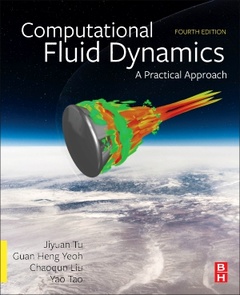Description
Computational Fluid Dynamics (4th Ed.)
A Practical Approach
Authors: Tu Jiyuan, Yeoh Guan Heng, Liu Chaoqun, Tao Yao
Language: English
Subjects for Computational Fluid Dynamics:
Keywords
mesh generation; boundary conditions; CFD Solver; solution control; vector plots; contour plots; continuity equation; momentum equation; energy equation; turbulent flow; structured mesh; mesh topology; finite difference method; finite volume method; spectral method; multigrid method; convergence; moving grids; Lattice Boltzmann Method; Monte Carlo Method; particle methods; discrete element method
99.33 €
Replenishment in progress
Add to cart560 p. · 19x23.4 cm · Paperback
Description
/li>Contents
/li>Biography
/li>Comment
/li>
2. CFD Solution Procedure – A Beginning
3. Governing Equations for CFD – Fundamentals
4. CFD Mesh Generation – A Practical Guideline
5. CFD Techniques - The Basics
6. CFD Solution Analysis – Essentials
7. Practical Guidelines for CFD Simulation and Analysis
8. Some Applications of CFD with Examples
9. Some Advanced Topics in CFD
10. Case Studies and Latest Developments on Applications of CFD (online bonus chapter)
Guan Heng Yeoh is a professor at the School of Mechanical and Manufacturing Engineering, UNSW, and a principal research scientist at ANSTO. He is the founder and editor of the Journal of Computational Multiphase Flows and the group leader of Computational Thermal-Hydraulics of OPAL Research Reactor, ANSTO. He has approximately 250 publications including 10 books, 12 book chapters, 156 journal articles and 115 conference papers with an H-index of 33 and over 4490 citations. His research interests are computational fluid dynamics (CFD); numerical heat and mass transfer; turbulence modelling using Reynolds averaging and large eddy simulation; combustion, radiation heat transfer, soot formation and oxidation, and solid pyrolysis in fire engineering; fundamental studies in multiphase flows: free surface, gas-particle, liquid-solid (blood flow and nanoparticles), and gas-liquid (bubbly, slug/cap, churn-turbulent, and subcooled nucleate boiling flows); computational modelling of industrial systems of single-phase and multiphase flows.
Dr. Chaoqun Liu received both BS (1968) and MS (1981) from Tsinghua University, Beijing, China and PhD (1989) from University of Colorado at Denver, USA. He is currently the Tenured and Distinguished Professor and the Director of Center for Numerical Simulation and Modeling at University of Texas at Arlington, Arlington, Texas, USA. He has worked on high order direct numerical simulation (DNS) and large eddy simulation (LES) for flow transiti
- Updated throughout, with new case studies, examples, references, and corrections according to readers’ and reviewers’ feedback
- Delivers the latest developments in CFD including the high-order and reduced-order modeling approach, machine learning–accelerated CFD, full coverage of high-speed fluid dynamics, and the meshless approaches to provide a broader overview of the application areas where CFD can be used
- Reorganized and rewritten to better meet the needs of CFD instructors and students
- Online resources include all lecturing and guest lecturing PPTs, computer lab practicing with step-by-step and screenshot guidelines, assignment and course project details, answers for review questions in each chapter, a new bonus chapter featuring detailed case studies, and result discussion




